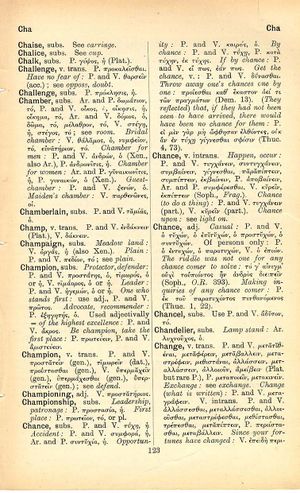chance: Difference between revisions
Ἔπαινον ἕξεις, ἂν κρατῇς, ὧν δεῖ κρατεῖν → Laus est, si, quibus est imperandum, tu imperes → Lob hast du, wenn du herrschst, worüber zu herrschen gilt
m (Woodhouse1 replacement) |
mNo edit summary |
||
| Line 5: | Line 5: | ||
[[prose|P.]] and [[verse|V.]] [[τύχη]], ἡ | [[prose|P.]] and [[verse|V.]] [[τύχη]], ἡ | ||
[[accident]]: [[prose|P.]] and [[verse|V.]] [[συμφορά]], ἡ, [[Aristophanes|Ar.]] and [[prose|P.]] [[ | [[accident]]: [[prose|P.]] and [[verse|V.]] [[συμφορά]], ἡ, [[Aristophanes|Ar.]] and [[prose|P.]] [[συντυχία]], ἡ. | ||
[[opportunity]]: [[prose|P.]] and [[verse|V.]] [[καιρός]], ὁ. | [[opportunity]]: [[prose|P.]] and [[verse|V.]] [[καιρός]], ὁ. | ||
Revision as of 16:37, 2 June 2020
English > Greek (Woodhouse)
substantive
accident: P. and V. συμφορά, ἡ, Ar. and P. συντυχία, ἡ.
opportunity: P. and V. καιρός, ὁ.
by chance: P. and V. τύχη, P. κατὰ τύχην, ἐκ τύχης.
if by chance: P. and V. εἴ πως, ἐάν πως.
get the chance, v.: P. and V. δύναμαι, δύνασθαι.
throw away one's chances one by one: προΐεσθαι καθ' ἕκαστον ἀεί τι τῶν πραγμάτων (Dem. 13).
(they reflected) that, if they had not been seen to have arrived, there would have been no chance for them: P. εἰ μὲν γὰρ μὴ ὤφθησαν ἐλθόντες, οὐκ ἂν ἐν τύχῃ γίγνεσθαι σφίσιν (Thuc. 4, 73).
verb intransitive
happen, occur: P. and V. τυγχάνειν, συντυγχάνειν, συμβαίνειν, γίγνομαι, γίγνεσθαι, παραπίπτειν, συμπίπτειν, ἐκβαίνειν, P. ἀποβαίνειν, Ar. and P. συμφέρεσθαι. V. κυρεῖν, ἐκπίπτειν (Soph., Fragment).
chance (to do a thing): P. and V. τυγχάνειν (part.), V. κυρεῖν (part.).
chance upon: see light on.
adjective
casual: P. and V. ὁ τυχών, ὁ ἐπιτυχών, ὁ προστυχών, ὁ συντυχών.
of persons only: P. ὁ ἐντυχών, ὁ παρατυχών, V. ὁ ἐπιών.
the riddle was not one for any chance comer to solve: τό γ' αἴνιγμ' οὐχὶ τοὐπιόντος ἦν ἀνδρὸς διειπεῖν (Soph., Oedipus Rex 393).
making inquiries of any chance comer: P. ἐκ τοῦ παρατυχόντος πυνθανόμενος (Thuc. 1, 22).

